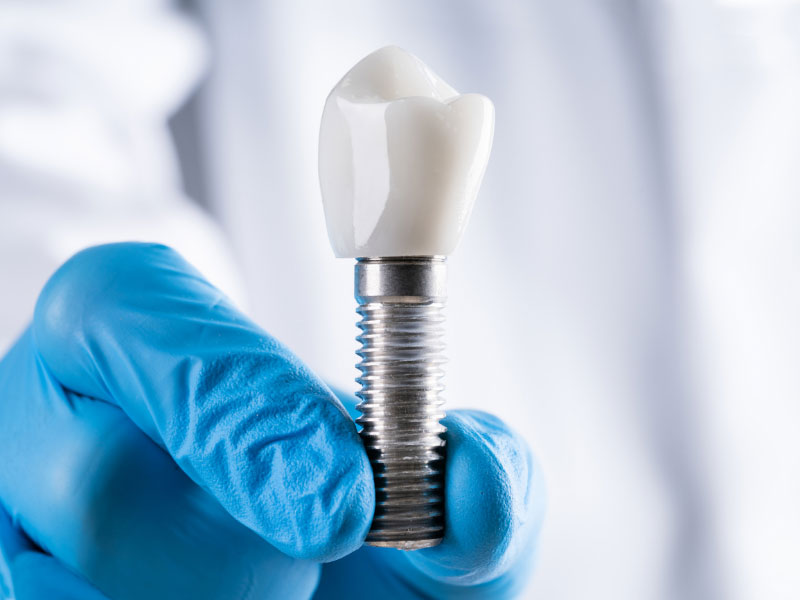Advantages of Dental Implants Over Other Tooth Replacement Options
Not only does losing a tooth look bad, but it can also make it hard to chew, talk correctly, and keep your bite healthy. When teeth are missing, the jawbone can lose bone, the teeth can move, and the form of the face can vary over time.
If you lose a tooth, you can get dental implants, bridges, or dentures to replace it. All of these choices have their own uses in restorative dentistry, but dental implants are the best, longest-lasting, and most natural-looking choice available right now.
Here are some reasons why dental implants are generally the greatest way to replace teeth for a long time.
1. Real Teeth Appear, Feel, and Work Like Dental Implants
There are various reasons why people select implants, but one of the most important is that they look and work like natural teeth.
- How they look: On top of the implants are custom-made crowns that match the color, shape, and size of your other teeth. It's hard to tell them apart because of this.
- Function: Implants are held in place in the jawbone like natural tooth roots, so you can bite and chew just as well as you could with your own teeth.
Dentures can slide or slip while you eat or talk. Bridges depend on surrounding teeth for support, which can modify how those teeth appear and feel.
2. Power That Lasts a Long Time
Dental implants can survive for 20 years or more if you take care of them. A lot of them last a lifetime. They are made of titanium or zirconia that bonds with your jawbone through a process called osseointegration.
- Implants: Built to last, so you won’t have to replace them often.
- Bridges: Normally need replacement every 7 to 10 years.
- Dentures: Usually need replacement or adjustment every 5 to 8 years.
Implants may cost more at first, but they usually save you money in the long run since they last longer.
3. Keeps Bones Strong
The bone around a missing tooth starts to break down since it doesn’t get any stimulus from chewing anymore. Over time, this bone loss can modify how your face looks, making it look older or sunken.
- Dental implants: Decrease bone loss and stimulate the jawbone like natural tooth roots.
- Bridges: Don’t replace the root, so the bone can still weaken.
- Dentures: Sit on top of the gums without stimulating bone, which accelerates bone loss.
4. Helps Keep Teeth Healthy
Traditional dental bridges require grinding down healthy teeth to support the replacement tooth. This permanently affects otherwise healthy teeth.
Dental implants don’t need support from adjacent teeth, helping your natural teeth stay strong and healthy.
5. More Comfort and Self-Assurance
Because they are fixed into the jawbone, implants feel as secure as genuine teeth. Many patients say they forget they even have an implant.
Some people with dentures may experience:
- Movement or slipping when eating or talking
- Gum irritation from friction
- The need for sticky adhesives
Bridges are more stable than dentures, but they don’t preserve bone as effectively and may require special cleaning tools.
6. Easy to Care For
Caring for dental implants is simple — the same as caring for real teeth (brushing, flossing, and routine checkups).
- Dentures: Require daily removal, cleaning, and soaking.
- Bridges: May require threaders or water flossers to clean underneath.
For convenience, implants are the easiest option.
7. Better at Eating and Talking
Dentures can sometimes affect speech, especially if they loosen over time. Implants eliminate this fear since they work just like natural teeth.
You can speak normally, bite into apples, chew steak, and enjoy favorite foods without worry. Bridges help with chewing but may not restore full bite strength like implants.
8. Value Throughout Time
Implants may cost more initially, but they last longer, need less maintenance, and prevent future costly problems — making them a smart long-term investment.
When you consider the improved quality of life — eating your favorite foods and smiling confidently — their value is clear.
A Quick Look at Dental Implants vs. Other Options
| Feature | Dental Implants | Dental Bridges | Dentures |
|---|---|---|---|
| Looks Real | ✅ Yes | ✅ Yes | ⚠ Sometimes |
| Keeps Bone Safe | ✅ Yes | ❌ No | ❌ No |
| Affects Adjacent Teeth | ✅ No | ❌ Yes | ✅ No |
| Lifespan | 20+ years | 7–10 years | 5–8 years |
| Maintenance | Easy (brush/floss) | Special floss | Remove daily |
| Stability | ✅ Excellent | ⚠ Good | ❌ Can slip |
Are Dental Implants Right for You?
While implants offer many benefits, not every patient is an immediate candidate. Healthy gums, adequate jawbone density, and good oral hygiene are essential for implant success.
If you have bone loss, your Lewiston dentist may recommend a bone graft before implant placement. A trained implant dentist can assess your needs, discuss your goals, and help you decide on the best tooth replacement option for your long-term health and lifestyle.
To Sum Up
There’s no one-size-fits-all solution for replacing missing teeth, but dental implants are often the best choice for their durability, natural look, bone preservation, and function. For anyone seeking a long-term, low-maintenance, and confidence-boosting option, implants are a standout solution.
Are you ready to get your smile back with dental implants?
Our experienced staff specializes in advanced tooth replacement options like bridges, dentures, and dental implants. We’ll guide you through every step — from your first consultation to your final restoration — to ensure your smile is healthy, functional, and beautiful for years to come.



